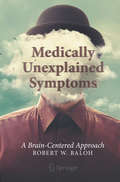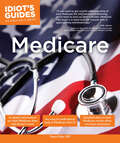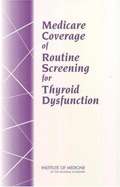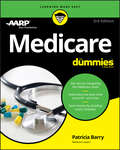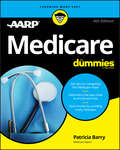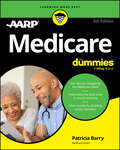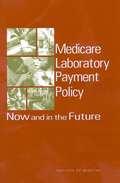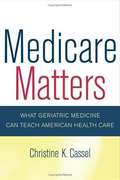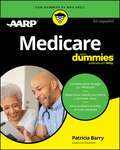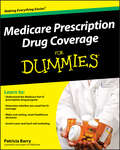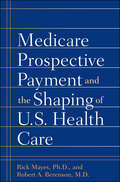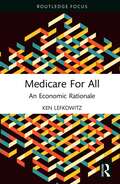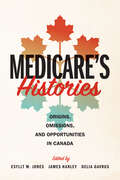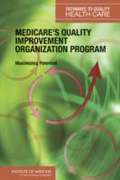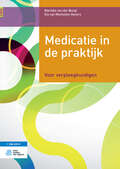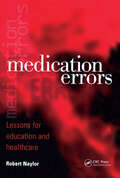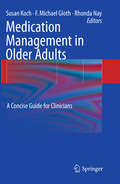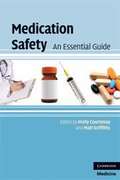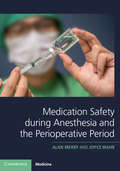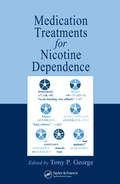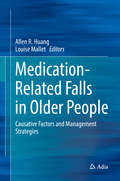- Table View
- List View
Medically Unexplained Symptoms: A Brain-Centered Approach
by Robert W. BalohDespite the rapid advances in medical science, the majority of people who visit a doctor have medically unexplained symptoms (MUS), symptoms that remain a mystery despite extensive diagnostic studies. The most common MUS are back pain, abdominal pain, headache, fatigue, and dizziness. This book addresses the obstacles of managing people with MUS in our modern day society from both a historical and contemporary perspective.Most MUS are psychosomatic in origin, caused by a complex interaction between nature and nurture, between biological and psychosocial factors. Psychosomatic symptoms are as real and as severe as the symptoms associated with structural damage to the brain. Unique and concise, the book explores the biological and psychosocial mechanisms, the clinical features, and current and future treatments of common MUS. Exploring the unsolved in an accessible manner, Medically Unexplained Symptoms invokes the methodologies of medical science, history, and sociology to investigate how brain flaws can lead to debilitating symptoms.
Medicare (Idiot's Guides)
by Tanya FekeDemystify the confusing web of medicare.Despite its widespread use, this complex program is often very hard to understand. Idiot's Guides: Medicare is an easy-to-understand guide that explains all of the benefits, rules, and processes. Clear, step-by-step instructions enable you navigate this complicated program.You'll learn how to find the right plan and avoid mistakes so that Medicare can serve you and your family. Learn what Medicare does and does not cover. Discover how much it will cost and how to reduce expenses. Not sure whether you're covered or how long you're covered? There is a section for that, too!The comprehensive guide also contains:• The history of the program;• The limitatoes of Medicare and how it works with insurance;• A breakdown of the costs;• Guidance on how Medicare fits into retirement planning;• Thorough coverage of the prescription drug program, Part D;• Closing the Medicare coverage gaps; and• Medicare's future and what it means for you.
Medicare Coverage of Routine Screening for Thyroid Dysfunction
by Committee on Medicare Coverage of Routine Thyroid ScreeningA report on the Medicare Coverage of Routine Screening for Thyroid Dysfunction
Medicare For Dummies
by Patricia BarryGet tips on navigating the Medicare maze Determine the best time to enroll—and how Save money by avoiding costly mistakes Medicare made easy So you've become eligible for Medicare, or perhaps a loved one is ready to join. Now what? This book answers all the questions you'll face as you navigate your way through this often-intimidating new terrain. You'll find out how to get all the benefits you qualify for and avoid the pitfalls that could cost you dearly. Making sense of Medicare can seem insurmountable—but this guide gives you the accurate, practical information you need to overcome the confusion and wield your Medicare card with confidence! Inside… Enroll at the right time Reduce out-of-pocket expenses Know your rights Find out what's covered Decide which options are best Deal with Medigap coverage
Medicare For Dummies
by Patricia BarryMedicare made simple Medicare brings valuable benefits to more than 58 million people and growing, but most of us don’t even know the basics of how Medicare can work best for us. That’s where Medicare For Dummies, 4th Edition comes in, explaining how this complex system functions and helping you confidently navigate your way through the maze to get the most out of your coverage. This indispensable resource untangles Medicare in friendly, straightforward language. Step by step, you’ll learn when and how to enroll, ways to avoid costly mistakes, and how to find the plan that brings the most benefit to you and your family. Reduce out-of-pocket expenses Know your rights and protections Choose the best policy for you Using this reassuring and comprehensive guide, you’ll be able to get the answers to all your questions, find guidance on how to act—and then get on with getting the benefits you need.
Medicare For Dummies
by Patricia BarryCracking the Medicare code Medicare For Dummies is your ultimate cheat sheet to demystifying Medicare. This newly updated guide covers the latest changes in benefits, including expanded coverage for mental health and chronic pain. In simple language and clear step-by-step instructions, this bestseller walks you through the enrollment process and helps you avoid costly mistakes along the way. You'll learn how to reduce your out-of-pocket expenses, and you'll get trusted guidance on finding the perfect policy for you and your family. Find answers to all your Medicare questions—even those you wouldn't think to ask—so you can develop a solid game plan to get the most out of Medicare. Learn the basics of Medicare and determine the best plan option for you Reference the latest prices, coverages, and other must-know information Get tips for minimizing your out-of-pocket expenses, whatever your health situation Find clear and thorough guidance for navigating Medicare at any age If you're currently enrolled in Medicare and want to maximize their benefits, or if you#re thinking about enrolling soon, Medicare For Dummies will help you better understand the often confusing process. This book is full of examples, ideas, and useful takeaways that empower you to take control of your healthcare—and your health.
Medicare Laboratory Payment Policy: Now and in the Future
by Institute of MedicineClinical laboratory tests play an integral role in helping physicians diagnose and treat patients. New developments in laboratory technology offer the prospect of improvements in diagnosis and care, but will place an increased burden on the payment system.Medicare, the federal program providing coverage of health-care services for the elderly and disabled, is the largest payer of clinical laboratory services. Originally designed in the early 1980s, Medicare's payment policy methodology for outpatient laboratory services has not evolved to take into account technology, market, and regulatory changes, and is now outdated. This report examines the current Medicare payment methodology for outpatient clinical laboratory services in the context of environmental and technological trends, evaluates payment policy alternatives, and makes recommendations to improve the system.
Medicare Matters: What Geriatric Medicine Can Teach American Health Care
by Christine K. CasselA critical assessment of the Medicare program and what it will take to make the program work successfully for our aging population, by a physician who is one of the nation's leaders in geriatric medicine.
Medicare Para Dummies
by Patricia BarryDescifrando el código de Medicare Medicare Para Dummies es la mejor guía para entender Medicare. En esta edición recién actualizada se detallan los últimos cambios en los beneficios, incluso la extensión de la cobertura para la salud mental y el manejo del dolor crónico. Con este best seller, escrito en un lenguaje claro y directo, aprenderás cómo inscribirte correctamente, evitar errores costos, minimizar gastos de bolsillo y elegir el plan adecuado para ti y tu familia. Resuelve todas tus dudas sobre Medicare, incluso las que nunca habías pensado, para que puedas desarrollar un plan sólido y maximizar tus beneficios. Aprende los conceptos básicos de Medicare y encuentra el mejor plan para ti Consulta los precios actualizados, coberturas e información esencial Obtén consejos para minimizar los gastos de tu bolsillo Descubre consejos claros para navegar Medicare sin importar tu edad Ya sea que estés inscrito en Medicare o si quieres inscribirte pronto, con Medicare Para Dummies podrás entender el proceso de manera más sencilla con ejemplos prácticos, consejos útiles e ideas claras, para que puedas tomar el control de tu salud y de tu atención médica.
Medicare Prescription Drug Coverage For Dummies
by Patricia BarryConfused about Medicare's drug coverage? You're not alone. Medicare Prescription Drug Coverage For Dummies explains Part D in plain English and shows you how to find the best deal among numerous drug-coverage plan options. Whether you're new to Medicare or already in the program, you'll navigate the system with more ease and confidence, avoid pitfalls and scams, and have plenty of help choosing the plan that's right for you.This easy-to-understand, consumer-friendly guide helps you find out whether Part D affects any drug coverage you already have and weigh the consequences of going without coverage. You'll find ways to compare plans, identify the one that covers your drugs at the least cost, and make sure you sign up at the right time. And you'll learn how to minimize your expenses, use the "right" pharmacies, and troubleshoot any problems with your coverage. Discover how to:Decide whether you need Part DUnderstand how Part D works, from costs to coverageChoose and enroll in the best plan for youGet up and running with Part DHandle the coverage gapLower your drug costsJoin and switch plansComply with long-term-care rules and rightsChallenge plan decisionsAvoid scams and hard-sell marketingNow, more than ever, you need clear, reliable information that helps you understand Part D and make smart, cost-saving healthcare decisions. You need Medicare Prescription Drug Coverage For Dummies.
Medicare Prospective Payment and the Shaping of U.S. Health Care
by Rick Mayes Robert A. BerensonThis is the definitive work on Medicare’s prospective payment system (PPS), which had its origins in the 1972 Social Security Amendments, was first applied to hospitals in 1983, and came to fruition with the Balanced Budget Act of 1997. Here, Rick Mayes and Robert A. Berenson, M.D., explain how Medicare’s innovative payment system triggered shifts in power away from the providers (hospitals and doctors) to the payers (government insurers and employers) and how providers have responded to encroachments on their professional and financial autonomy. They conclude with a discussion of the problems with the Medicare Modernization Act of 2003 and offer prescriptions for how policy makers can use Medicare payment policy to drive improvements in the U.S. health care system.Mayes and Berenson draw from interviews with more than sixty-five major policy makers—including former Treasury secretary Robert Rubin, U.S. Representatives Pete Stark and Henry Waxman, former White House chief of staff Leon Panetta, and former administrators of the Health Care Financing Administration Gail Wilensky, Bruce Vladeck, Nancy-Ann DeParle, and Tom Scully—to explore how this payment system worked and its significant effects on the U.S. medical landscape in the past twenty years. They argue that, although managed care was an important agent of change in the 1990s, the private sector has not been the major health care innovator in the United States; rather, Medicare’s transition to PPS both initiated and repeatedly intensified the economic restructuring of the U.S. health care system.
Medicare Survival Guide Advanced: Basics and Beyond
by Toni KingWhat You Don't Know Will Hurt You!Turning 65 in America is a milestone and one of the markers is enrolling in Medicare. But the system is so complicated, and there is a lot of false information out there. In Toni King's Medicare Survival Guide Advanced: Basics and Beyond, Toni gives you the critical steps you need to enroll in Medicare properly. Toni shares various situations that she has experienced with her many clients during Medicare consultations, and gives you the information and tools you need to enroll on time to avoid the "famous" Medicare Part B and D penalties. Medicare Survival Guide Advanced helps you understand Medicare step by step... Learn How to Enroll the Correct Way • Still Working Past 65 • Turning 65 • VA Benefits • Laid-off or Retiring What Medicare Option Is Best for You • Medicare Supplement vs. Advantage • Losing Retirement Benefits How to Avoid • The Donut Hole • Part B Penalties • Part D IRMAA Penalties If you are enrolling in Medicare and are confused by the commercials and telemarketers, or from the information that well-meaning friends or family members give, let Toni guide you through the maze of Medicare.
Medicare and You 2011
by Department of Health Human ServicesThe official government handbook with important information about: new changes to Medicare; your Medicare benefits; choosing a health plan that's right for you; & your Medicare privacy rights.
Medicare for All: An Economic Rationale
by Ken LefkowitzHealthcare continues to be one of the defining political issues in the US. Though many progressives argue for an overhaul of the current system based on ethical or humanitarian principles, this important book offers an economic rationale for providing healthcare for all. The purpose of Medicare For All: An Economic Rationale is to demonstrate how current runaway healthcare prices can be addressed by implementing the cost-effectiveness of Medicare for All. Written by a former Corporate Director and healthcare consultant, this book illustrates why the current free market model for healthcare is ultimately failing the country by not containing rising healthcare costs, which has a severe economic impact on all Americans, including those covered by employer medical plans. Major factors in that failure; the lack of transparency, human decision factors, and high administrative costs in the current system are explored. The book demonstrates that implementing Medicare For All, providing comprehensive benefits with no copays, private insurance premiums, deductibles, or other cost-sharing, will not only improve the lives of most Americans, but will be far more cost-effective than the present system. This is an incisive, important contribution to a topic that continues to shape American political discourse and will be of interest to scholars and professionals engaged in this area as well as politicians and the public in general.
Medicare's Histories: Origins, Omissions, and Opportunities in Canada
by Esyllt W. Jones, James Hanley, and Delia GavrusMedicare is arguably Canada’s most valued social program. As federally-supported medicare enters its second half-century, Medicare’s Histories brings together leading social and health historians to reflect on the origins and evolution of medicare and the missed opportunities characterizing its past and present. Embedding medicare in the diverse constituencies that have given it existence and meaning, contributors inquire into the strengths and weaknesses of publicly insured health care and critically examine medicare’s unfinished role in achieving greater health equity for all people in Canada regardless of race, status, gender, class, age, and ability. Fundamental to the stories told in Medicare’s Histories is the essential role played by communities ¬– of activists, critics, health professionals, First Nations, patients, families, and survivors – in driving demands for health reform, in identifying particular omissions and inequities exacerbated or even created by medicare, and in responding to the realities of medicare for those who work in and rely on it. Contributors to this volume show how medicare has been shaped by politics (in the broadest sense of that word), identities, professional organizations, and social movements in Canada and abroad. As COVID lays bare social inequities and the inadequacies of health care delivery and public health, this book shows what was excluded and what was – and is – possible in health care.
Medicare's Quality Improvement Organization Program: Maximizing Potential
by Institute of MedicineMedicare's Quality Improvement Organization Program is the second book in the new Pathways to Quality Health Care series. Focusing on performance improvement, it considers the history, role, and effectiveness of the Quality Improvement Organization (QIO) program and its potential to promote quality improvement within a changing health care delivery environment that includes standardized performance measures and new data collection and reporting requirements. This book carefully examines the QIOs that serve every state as well as the national program that guides and supports them. In addition, it highlights the important roles that a national program with private organizations in each state can play in promoting higher quality care. Medicare’s Quality Improvement Organization Program looks closely at the technical assistance role of the QIO program and the need to encourage and support providers to improve their performance. By providing an in-depth assessment of the federal experience with quality improvement and recommendations for program improvement, this book helps point the way for those who strive to create higher quality and better value in health care. Intended for multiple audiences, Medicare's Quality Improvement Organization Program is essential reading for members of Congress, the federal executive branch, the QIOs, health care providers and clinicians, and stakeholder groups.
Medicatie in de praktijk: Voor verpleegkundigen
by Marieke Burgt Els Mechelen-GeversVan mbo-verpleegkundigen wordt behoorlijk wat kennis over medicatie verwacht. Een boek op maat voor deze verpleegkundigen in opleiding ontbrak tot nu toe. Dat boek is er nu. Medicatie in de praktijk biedt informatie over geneesmiddelen en de werkingsprincipes, verpleegkundige taken rondom medicatietoediening en de rol van de verpleegkundige in de medicatieketen. Daarnaast bevat dit studieboek een aantal hoofdstukken over geneesmiddelen. Elk hoofdstuk biedt een overzicht van de meest gebruikte groepen geneesmiddelen, uitleg over de werking en andere praktisch bruikbare informatie. Het boek is verrijkt met veel infographics, praktijkvoorbeelden en praktijkgerichte opdrachten. Op de website www. studiecloud. nl is een digitale versie van het boek beschikbaar met links naar interessante websites en per hoofdstuk oefenvragen en samenvattingen. Medicatie in de praktijk is bruikbaar op de opleiding, tijdens stages of tijdens de leer-werkopleiding. De kennis uit dit boek maakt de gebruikers wegwijs in het farmacotherapeutisch kompas. Ook hbo-v-studenten kunnen veel plezier hebben van Medicatie in de praktijk. Marieke van der Burgt is arts en voorlichtingsdeskundige. Zij is als docent medische vakken verbonden aan de opleiding verpleegkunde van het Rijn IJssel. Els van Mechelen-Gevers is diëtist en freelance publicist.
Medication Errors: Lessons for Education and Healthcare
by Robert NaylorAdverse events in patients caused by medical management are a serious and grossly underreported public health problem. One patient in ten entering hospital will suffer an adverse event of impairment, disability or death. This book is a major comprehensive examination of the incidence and causes of adverse events. Using data obtained from hospitals within the United Kingdom, United States and other developed countries, it examines the risk factors leading to errors, the human and financial costs, and the scope to reduce errors. In particular, it focuses on the need for a critical reappraisal of undergraduate teaching and clinical tuition. All healthcare professionals throughout primary and secondary care, including clinicians, managers and policy makers, and patient and carer groups, can benefit from reading this book. It identifies possible solutions and how adverse events and medication errors can be reduced, resulting in improved patient care.
Medication Management in Older Adults
by Rhonda Nay Susan Koch F. Michael GlothMedication use is the predominant form of health intervention in our society. And as we age, the likelihood of medication use increases dramatically, with more than 80 percent of those over age 65 using one or more medications. Along with that, the potential for medication errors also increases. Indeed adverse drug reactions (ADRs) and adverse drug events (ADEs) are a significant problem in older adults. Written in a practical format by contributors from Australia and the United States, Medication Management in Older Adults: A Concise Guide for Clinicians presents the available evidence on research interventions designed to reduce the incidence of medication errors in older adults, with a focus on acute, subacute, and residential (long-term) care settings. Because medication errors can occur at all stages in the medication process, from prescription by physicians to delivery of medication to the patient by nurses, and in any site in the health system, it is essential that interventions be targeted at all aspects of medication delivery. Chapters cover the principles of medical ethics in relation to medication management; common medication errors in the acute care sector; medication management in long-term care settings; nutrition and medications; the outcomes of a systematic review; dose form alterations; Electronic Health Records (EHR), Computerized Order Entry (COE), Beers criteria; and pharmacokinetics and pharmacodynamics. For those clinicians especially concerned with providing the best possible outcomes for their older adult patients, Medication Management in Older Adults: A Concise Guide for Clinicians is an invaluable resource and a significant contribution to the burgeoning literature on medication errors.
Medication Safety
by Molly Courtenay Matt GriffithsThe supply and administration of medicines is an area of practice in which a number of healthcare professionals (e.g. nurses, pharmacists and allied health professionals) are involved. Prescribing is a relatively new role which many of these healthcare professionals have adopted. Medication Safety focuses on promoting safety in the delivery of medicines. Chapters explore the various stages in the medication process including safety in prescribing, dispensing and administering drugs. Adverse reactions, parenteral administration, dosage calculations, safety with controlled drugs, and reporting errors and near misses are all addressed in evidence-based contributions from a highly experienced team of contributors. This text is essential reading for all healthcare professionals involved in the delivery of medicines to patients.
Medication Safety during Anesthesia and the Perioperative Period
by Alan Merry Joyce WahrWith medication errors in healthcare an internationally recognised problem, this much-needed book delivers a comprehensive approach to understanding medication safety in the perioperative period. It reviews what medication adverse events are, and how often and where these errors occur, as well as exploring human cognitive psychology and explaining why things can go wrong at any time in a complex system. Detailed discussions around mistakes, judgement errors, slips and lapses, and violations, are presented alongside real-life examples of the indistinct line between negligence and inevitable error. The co-authors bring a wide and practical perspective to the theories and interventions that are available to improve medication safety, including legal and regulatory actions that further or impede safety. Essential reading for anesthesiologists, nurses, pharmacists and other perioperative team members committed to improving medication safety for their patients, and also an invaluable resource for those who fund, manage and regulate healthcare.
Medication Treatments for Nicotine Dependence
by Tony P. GeorgeDespite the prevalence of both pharmaceutical and behavioral approaches to encourage cessation, over a billion people still indulge in tobacco. Even in the U.S., where tobacco use is considered a clearly treatable and socially regrettable condition, a significant percentage of individuals remain resistant to treatment modalities. It is believed tha
Medication-Induced Movement Disorders
by Joseph H. FriedmanMedications that may produce movement disorders are widely used. The resulting disorders are often highly disconcerting for the patient and their relatives, especially when the connection between medication and disorder is not recognized. However, ascribing an adverse drug effect to medication exposure is often difficult, especially when the side effect is rare. Covering various drugs - including the major classes of medications working primarily on the brain, specifically antipsychotics and antidepressants – this all-encompassing review of medication-induced movement disorders aids early recognition and improved treatment. The problem of what to do when the offending medication cannot be reduced is also reviewed. It discusses the best options for evaluation and treatment, including medical imaging and deep brain stimulation, and guides the clinician in managing the disorder, making this a vital reference for medical specialists and consultants in neurology and neuropharmacology and any clinician seeing patients on medications crossing the blood-brain barrier.
Medication-Related Falls in Older People
by Allen R. Huang Louise MalletComprising a single repository of knowledge andscientific evidence in the field, this book provides strategies to mitigatefall risk by providing information on the complex interactions between agingprocesses, co-morbid conditions and prescribed medications in older patients. Geriatric health is becoming a more prominentissue as the population ages, and balancing the beneficial effects of medicationagainst the potential and real side-effects in these patients involves adeliberate and thoughtful task: physiologic aging, the accumulation ofco-morbidities, and the use of drugs to manage various conditions and symptomsgenerates a unique set of problems for each patient. Falls are a dreaded event in older people. Theevent can affect a person in a physical, and psychological manner, resulting insoft tissue and bony injury, fear of falling, and depression. Theidentification of and reduction in fall risks in older people is a worldwideconcern, and reducing the incidence of falls is a ubiquitous quality measure ofhealth care delivery. Heterogeneity amongst older people precludes a singlesolution. However, physicians and others involved in the care of geriatricpatients will benefit from the presented insights into how medication use canbe modified to limit its impact as a contributing factor.
Medication-Related Osteonecrosis of the Jaws
by Sven OttoOsteonecrosis of the jaws is a well-known side-effect of antiresorptive therapy that predominantly occurs in patients suffering from malignant diseases and receiving intravenous administrations of nitrogen-containing bisphosphonates or subcutaneous administrations of denosumab, a monoclonal antibody. Less frequently it may also be observed in patients with osteoporosis who are being treated with these antiresorptive drugs This textbook provides detailed, up-to-date information on all aspects of medication-related osteonecrosis of the jaws, including clinical features, pathogenesis, treatment options, and preventive measures. It also explains safe prevention and treatment strategies for patients receiving antiresorptive drugs who require extractions, implant insertions, and other dento-alveolar surgeries. This book will be of major interest for medical and dental students, dentists, and oral and maxillofacial surgeons as well as osteologists and oncologists.
